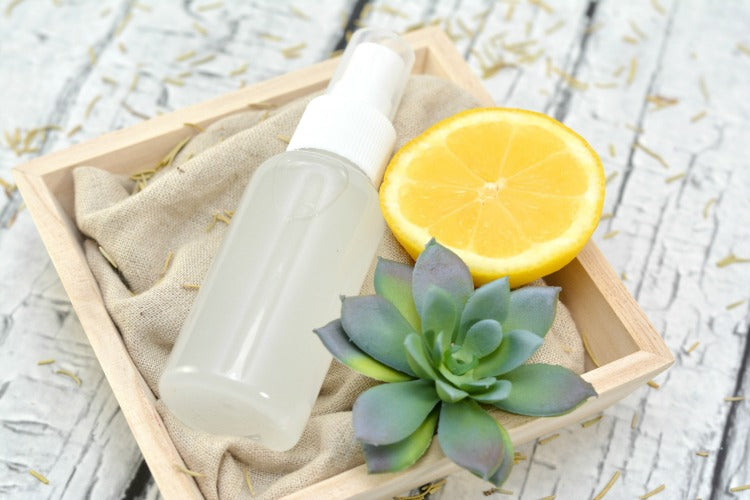When I venture out into the great outdoors (or even in my backyard), I am very mindful of avoiding pesky insects and avoiding harsh chemical insect repellents!
The most common ingredient used in commercial insect repellents is DEET (N,N-Diethyl-meta-toluamide) – a solvent that is not recommended for use in children under 12 years of age or in pregnant women.
So are their alternatives?? ABSOLUTELY!!!
Natural Alternatives
Many plants have developed their own means of repelling undesirable insects and attracting desirable ones. We can harness this evolutionary design for our own uses and make highly effective and safe natural insect repellents from the essential oils of plants.
Natural Insect Repellent Chart Here!!!!
Making Your Own Natural Insect Repellent
As you can see in the chart above, different insects are repelled by different chemicals, so you can make a highly effective repellent by combining a few different insect-repelling essential oils.
You will need:
- 10-25 drops (total) of essential oils
- 2 tablespoons of carrier oil or alcohol (good options include: olive oil, grapeseed oil, vodka)
Great White North Mix: Effective against mosquitoes, black flies and ticks
Equal parts of:
- Cinnamon oil
- Lemon eucalyptus
- Peppermint
- Vanilla
- Lemongrass
- Geranium
Patio Power Mix: Effective against ants, mosquitoes, flies and wasps
Equal parts of:
- Peppermint
- Lemongrass
- Vanilla
Mix the essential oils with the carrier oil or alcohol in a small spray bottle. Spray the natural insect repellent onto skin, clothing, patio chair cushions, etc. You’ll want to re-apply the repellent every 2 hours or after swimming or sweating.
Other Natural Insect Repellents
Citronella candles – offers moderate protection against mosquitoes. A University of Guelph study found that sitting near a citronella candle resulted in 42.3% fewer bites. May not be enough on their own, but can contribute to overall insect control.
Undiluted essential oils – select a few undiluted oils from the list above and add to candles for decoration and insect repelling. Dr. Crystal Draper also recommends applying undiluted vanilla oil to the pulse points (wrists, neck, ankles) to repel mosquitoes with a pleasant smell.
Avoid floral scents – avoid using hair and body care products (including sunscreen) that have a floral scent. Insects (especially mosquitoes and wasps) are attracted to these scents. Consider mixing some of the essential oil mix above into your shampoo when camping or cottaging.
After the Bite
If you get bit, try applying tea tree oil directly to the bite. Tea tree is antiseptic, antibacterial, anti-inflammatory and usually non-irritating. Pure lavender oil can also be used.
Disclaimer
The advice provided in this article is for informational purposes only. It is meant to augment and not replace consultation with a licensed health care provider. Consultation with a Naturopathic Doctor or other primary care provider is recommended for anyone suffering from a health problem.
__________________________________________________________
Dr. Sylvia Santos is a Naturopathic Doctor practicing in Vaughan, Ontario, Canada. She is a passionate about health promotion and encourages her patients and readers to embrace their full health potential. You can follow Dr. Santos on Instagram, Facebook and Twitter or contact her at ssantos@natcanintegrative.com.
__________________________________________________________
Select resources
Barnard Donald R et al. “Laboratory evaluation of mosquito repellents against Aedes albopictus, Culex nigripalpus, and Ochierotatus triseriatus (Diptera: Culicidae).” Journal of Medical Entomology. 41.4 (2004): 749-57.
Fradin Mark S et al. “Comparative efficacy of insect repellents against mosquito bites.” New England Journal of Medicine. 347.1 (2002)13-8.
Ives AR et al. “Testing vitamin B as a home remedy against mosquitoes.” Journal of the American Mosquito Control Association. 21.2 (2005):213-7.
Kim SI et al. “Repellency of aerosol and cream products containing fennel oil to mosquitoes under laboratory and field conditions.” Pesticide Management Science. 60.11 (2004) 1125-30.
Lindsay L. Robbin et al. “Evaluation of the efficacy of 3% citronella candles and 5% citronella incense for protection against field populations of Aedes mosquitoes.” Journal of the American Mosquito Control Association. 12.2 (1996):293-4.
Natural Standard. “Insect bites and stings and related conditions. Levels of scientific evidence for specific therapies.” 2011.
Park BS et al. “Monoterpenes from thyme (Thymus vulgaris) as potential mosquito repellents.” Journal of the American Mosquito Control Association. 21.1 (2005):80-3.
Rajan TV et al. “A double-blinded, placebo-controlled trial of garlic as a mosquito repellant: a preliminary study.” Medical and Veterinary Entomology. 19.1 (2005):84-9.
Trongtokit Y et al. “Comparative repellency of 38 essential oils against mosquito bites.” Phytotherapy Research. 19.4 (2005):303-9.
Tuetun Benjawan et al. “Repellent properties of celery, Apium graveolens L., compared with commercial repellents, against mosquitoes under laboratory and field conditions.” Tropical Medicine and International Health. 10.11 (2005):1190-8.
Xue RD et al. “Laboratory evaluation of toxicity of 16 insect repellents in aerosol sprays to adult mosquitoes.” Journal of the American Mosquito Control Association. 19.3 (2003):271-4.


